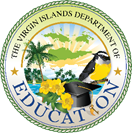The Virgin Islands Department of Education (VIDE) recognizes the critical role guidance counselors play in students’ academic achievement and life success. Guidance Counselors are respected and supported as integral team members responsible for student related activities. The guidance counselor evaluation process supports the continuous growth of guidance counselors as active members of school communities to improve student learning.
|
USEFUL LINKS
Evaluation Help pdf Staff Accessing Evidence (795 KB) Final Performance Cut Scores Distinguished: 3.57-4.00 Proficient: 2.75-3.56 Basic: 1.84-2.74 Unsatisfactory: 1.00-1.83
|
The U.S. Virgin Islands Guidance Counselor Evaluation Guidebook details the evaluation process for all guidance counselors across the territory. In addition, this webpage provides access to important information and documents that guidance counselors and principals use to evaluate and reflect on guidance counselor performance. The required forms are also available in TalentEd, the VIDE electronic human resources management system. pdf ASCA Ethical StanDards (134 KB)pdf ASCA COMPETENCIES (205 KB) Guidance Counselor Standards describe the role, responsibilities, and competencies of guidance counselors to guide them in their professional practice and growth. Two sets of standards were adopted by the Task Force subcommittee: The ASCA Ethical Standards for School Counselors (2010) and ASCA School Counselor Competencies (2012). A framework (also called a rubric) describes standards of practice in observable and measurable terms and articulates performance progression or levels of performance. A framework focuses the evaluation on practices that are most important. The VI Guidance Counselor Framework was adapted from the Pennsylvania Department of Education Guidance Counselor Framework (based on the Framework for Teaching by Charlotte Danielson). The VI Guidance Counselor Framework aligns with the VI Guidance Counselor Standards. Measurement ToolsThree measures have been selected for guidance counselor evaluation. All have been aligned to the VI Guidance Counselor Standards and Framework to provide fair and accurate evaluation of guidance counselor practice.
The Observation/Artifact Review is comprised of four components based on the four domains of the framework. Through discussion, the guidance counselor and administrator will discuss individual components and the evidence that will be collected for the evaluation (artifacts and/or observation) to measure performance on the selected components.
The growth plan includes two goals: a growth goal and a collaborative goal. The US Virgin Islands Guidance Counselor Evaluation Guidebook provides instructions, for developing and completing a Professional Growth Plan (PGP). The Professional Growth Plan template can be found on this site under Resources and in TalentEd.
Being present is an important professional requirement for all employees of the VIDE. Guidance counselors play a significant role in instruction and support of students as well as school activities, therefore it is important that guidance counselors are on time and present. Guidance Counselor Time contributes 10% of the total summative evaluation score for all guidance counselors. Guidance Counselor Time is determined by attendance and tardies in TimeForce and is scored using the rubric in the VIDE Attendance Policy.
|
RESOURCES Evaluation Guidebook pdf ASCA Ethical Stanards (134 KB) pdf ASCA Competencies (205 KB) pdf Aligning Danielson Framework with the School Counseling Profession (738 KB) pdf Common Rating Errors and How to Avoid Them (336 KB) Timeline SY 2016-17 Evaluation Planning Professional Growth Plan (PGP)
Mid-Year Check-in Meeting
Observation/Artifact Review
Guidance Counselor Time
Summative Evaluation
|

